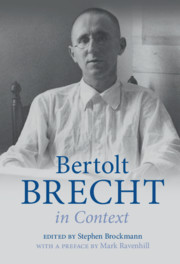Book contents
- Bertolt Brecht in Context
- Bertolt Brecht in Context
- Copyright page
- Contents
- Figure
- Notes on Contributors
- Chronology
- Abbreviations
- Preface
- A Note on Brecht in English
- Introduction
- Part I Brecht’s World
- Part II Brecht’s Work
- Chapter 13 The Work of the Theater
- Chapter 14 Brecht and Marxism
- Chapter 15 Brecht and Photography
- Chapter 16 Brecht and Film: Medium and Masses
- Chapter 17 Brecht and Fiction
- Chapter 18 Gestus in Context
- Chapter 19 Brecht’s Ethics
- Chapter 20 Brecht and Dialectics
- Chapter 21 Brecht and East Asia
- Chapter 22 Brecht’s Work with Musical Composers
- Part III The World’s Brecht
- Concise Bibliography
- Index
Chapter 22 - Brecht’s Work with Musical Composers
from Part II - Brecht’s Work
Published online by Cambridge University Press: 28 May 2021
- Bertolt Brecht in Context
- Bertolt Brecht in Context
- Copyright page
- Contents
- Figure
- Notes on Contributors
- Chronology
- Abbreviations
- Preface
- A Note on Brecht in English
- Introduction
- Part I Brecht’s World
- Part II Brecht’s Work
- Chapter 13 The Work of the Theater
- Chapter 14 Brecht and Marxism
- Chapter 15 Brecht and Photography
- Chapter 16 Brecht and Film: Medium and Masses
- Chapter 17 Brecht and Fiction
- Chapter 18 Gestus in Context
- Chapter 19 Brecht’s Ethics
- Chapter 20 Brecht and Dialectics
- Chapter 21 Brecht and East Asia
- Chapter 22 Brecht’s Work with Musical Composers
- Part III The World’s Brecht
- Concise Bibliography
- Index
Summary
This article argues that Brecht’s unique musicality as a poet led to a rich and rarely paralleled collaboration with musical composers. While the young Brecht sketched out his own music for his early poetry and songs, he soon turned to professional composers as partners. The article focuses on Brecht’s three major musical collaborators, Kurt Weill, Hanns Eisler, and Paul Dessau. In addition to the innovative works that Brecht created with these composers, they also stimulated important theoretical writings that led to new forms of opera, as in Brecht/Weill’s Mahagonny and The Threepenny Opera, or a revolutionary aesthetics of film music, as in Eisler/Adorno’s Composing for the Films, which is strongly influenced by Brecht.
Keywords
- Type
- Chapter
- Information
- Bertolt Brecht in Context , pp. 191 - 198Publisher: Cambridge University PressPrint publication year: 2021

